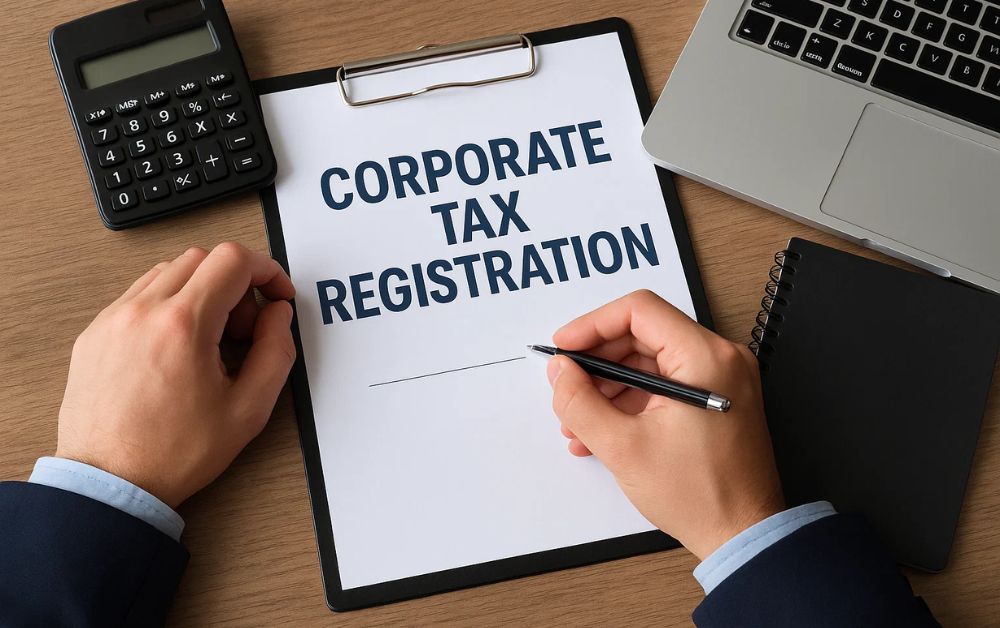The UAE has introduced corporate tax as part of its efforts to align with international tax standards while diversifying its economy. Businesses operating in the country are now required to register for corporate tax with the Federal Tax Authority (FTA). While the process of corporate tax registration in UAE is relatively straightforward, many companies face delays due to missing or incomplete documentation.
To make your application process smooth and efficient, it is important to know exactly which documents are needed. This blog provides a detailed guide on the required documents for corporate tax registration and why each of them is necessary.
Trade License
The most essential document for corporate tax registration is a valid trade license. This proves that your business is legally established in the UAE and authorized to conduct its activities.
- The trade license should be current and renewed.
- Businesses with multiple licenses must submit all copies.
- It ensures that your company falls within the scope of taxable entities.
Business Owner and Partner Identification
To verify ownership and management details, the FTA requires identification documents of the company’s owners and shareholders.
- Emirates ID (for UAE residents).
- Passport copies (for foreign shareholders or directors).
- Contact information of key stakeholders.
Providing accurate identification ensures transparency and compliance with legal requirements.
Memorandum of Association (MoA) or Articles of Association (AoA)
The MoA or AoA is required to demonstrate the structure of your company, its shareholding pattern, and authorized activities.
- Confirms the business objectives and scope of work.
- Helps the FTA determine the category under which the business falls.
- Verifies the ownership structure, which is vital for tax assessment.
Financial Statements
Financial statements are vital for determining the taxable income of the business. Typically, audited or management-prepared statements are required.
- Balance sheets and profit-and-loss accounts.
- Annual turnover details.
- Supporting documents for business expenses and revenues.
For small businesses or startups, bank statements and simplified financial records may also be required.
Certificate of Incorporation
The certificate of incorporation validates that your business entity is legally recognized. It is especially necessary for companies established as limited liability companies (LLCs), private limited companies, or joint ventures.
This document ensures that your business has legal standing before the authorities.
Tax Registration Number (TRN) for VAT (if applicable)
If your company is already registered under VAT, you may be required to submit your Tax Registration Number (TRN).
- This helps the FTA cross-check your compliance history.
- Ensures that VAT-registered businesses are aligned with corporate tax obligations.
Business Contact Information
Applicants must provide updated business contact details, including:
- Registered office address.
- Email ID & phone number of the authorized signatory.
- PO Box details (if applicable).
Accurate contact information allows the FTA to communicate important updates and approvals.
Bank Account Details
The business’s bank account details are often required to confirm financial transactions. These include:
- IBAN number and bank name.
- Recent bank statements.
- Account ownership verification.
This ensures that tax-related payments and refunds are processed smoothly.
Power of Attorney (if applicable)
If a third party such as a tax agent or consultant is handling the registration on behalf of the business, a power of attorney document is mandatory.
- Grants legal authority to the agent.
- Protects both the company and the consultant from compliance risks.
- Ensures accountability during the registration process.
Additional Supporting Documents
Depending on the nature and size of your business, the FTA may request additional documents such as:
- Lease agreement of business premises.
- Customs or import/export licenses.
- Professional licenses for specialized industries.
- Details of related parties or subsidiaries.
Providing these documents upfront reduces the chances of delays or rejection.
Why Accurate Documentation Matters
Accurate and complete documentation is the foundation of a successful corporate tax registration. Missing or incorrect paperwork can lead to:
- Delays in approval from the FTA.
- Penalties or fines for late registration.
- Complications in future tax filings.
By preparing all necessary documents in advance, businesses can save time and avoid unnecessary costs.
Tips to Simplify the Documentation Process
- Organize Documents Early – Gather and verify your documents before starting the registration.
- Use Professional Help – Consider working with experienced tax consultants to ensure compliance.
- Keep Digital Copies – Upload high-quality scanned versions to speed up the online process.
- Stay Updated – Regularly check FTA guidelines, as requirements may change over time.
Final Thoughts
Corporate tax registration is a mandatory need for businesses operating in the UAE. While the process itself is simple, the accuracy and completeness of documents determine how smooth your registration will be. From trade licenses to financial statements, every document plays a vital role in compliance and transparency. Preparing well in advance ensures that your business meets all obligations without delays or penalties.
For expert guidance and a seamless corporate tax registration in UAE, trust Maydor Advisory to manage your documentation and compliance needs with accuracy and efficiency.


